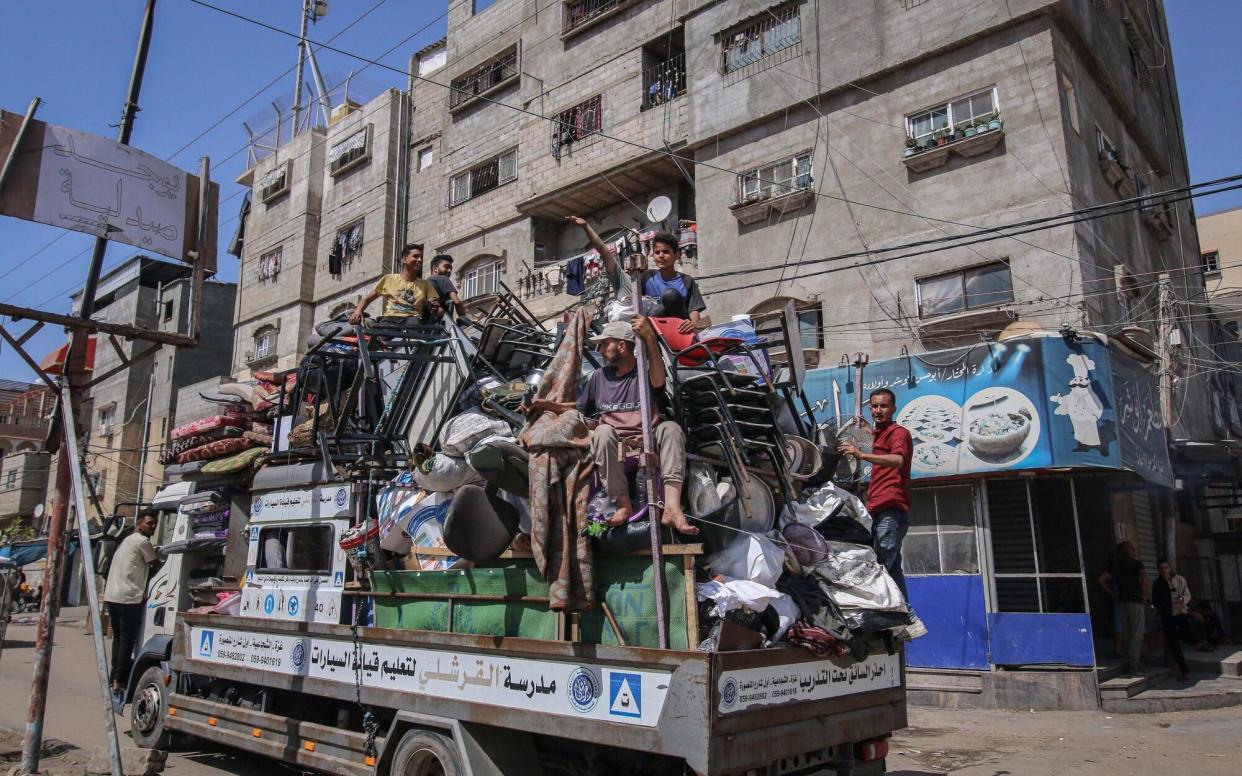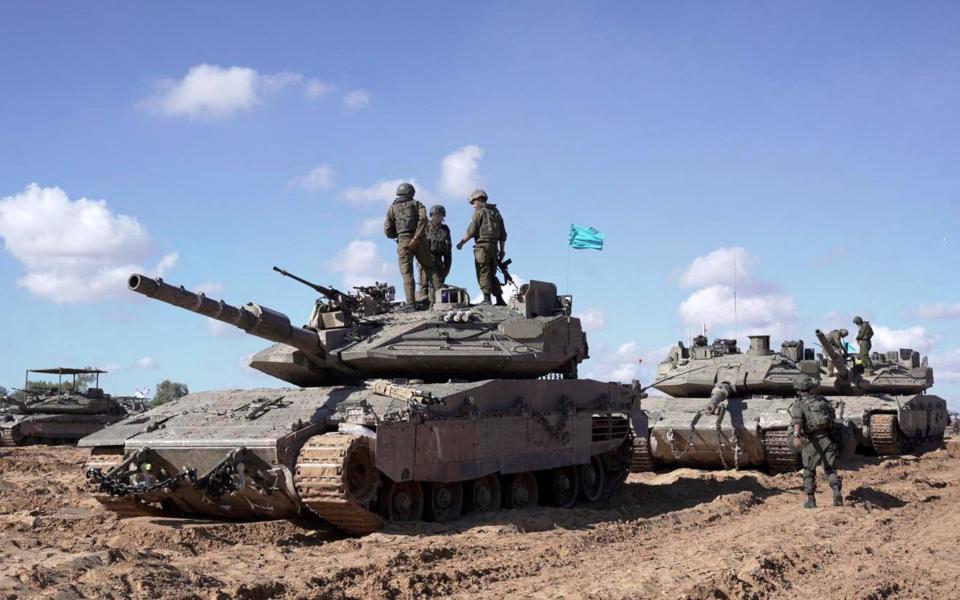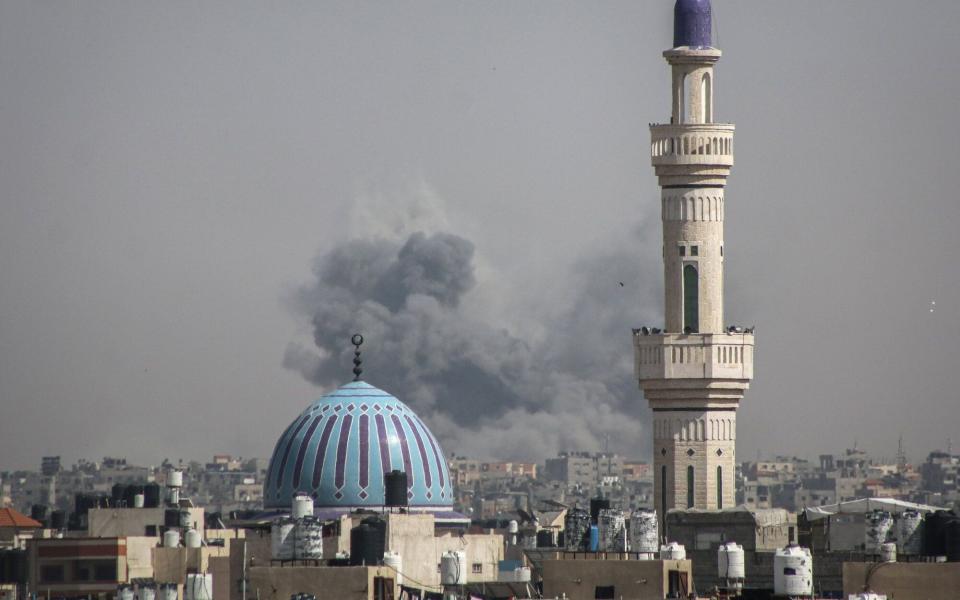Israel may have violated humanitarian law with American weapons, US says

Israel may have used American weapons in ways that violated international law, the US State Department has found.
In a highly-critical report, it concluded it was “reasonable to assess” US arms had been used in Gaza in “instances inconsistent” with international humanitarian law.
However, it stopped short of a specific finding on whether the Jewish state had broken international law which would justify Washington withholding military aid.
A finding that Israel had violated international law would have enabled Joe Biden to restrict arms deliveries, since it would represent a breach of US laws governing arms transfers to foreign militaries.
The conclusions are made in a State Department report which was ordered by Mr Biden in February, a declassified version of which was delivered to Congress and released late on Friday afternoon.
It is unrelated to Mr Biden’s decision to delay a delivery of heavy bombs and other weaponry to Israel amid a public rift between the US president and Benjamin Netanyahu over his planned ground invasion of Rafah.
The Israeli Prime Minister has remained defiant in the face of Mr Biden’s hardening stance, declaring: “If Israel needs to stand alone, it will stand alone.”
It comes as the Israel Defense Forces (IDF) appeared to have encircled the east of Rafah in Gaza as tanks were seen on the road bisecting the densely populated city from east to west.

The IDF are pressing on with their operation against Gaza’s last largely intact city as aid organisations warned of catastrophically dwindling supplies because of the closing of the main crossing point into Gaza.
Israeli tanks captured the main road dividing Rafah’s east and west on Friday morning, according to local journalists.
Residents of western Rafah said they were hearing near-constant bombing as Israeli troops apparently engaged with Hamas fighters there.
Earlier on Friday, artillery strikes on Rafah were reported a day after Joe Biden, the US president, threatened to suspend the supply of bombs and other weapons to Israel if a full-scale offensive in Gaza’s last city largely unaffected by heavy fighting were to go ahead.
A resident of Tel al-Sultan in the west of Rafah said Israeli tanks were three or four miles away and that everywhere in Rafah was being targeted with airstrikes.

On Friday, Israeli troops fought at close quarters with groups of Hamas fighters, killing several, according to the IDF.
Hamas said its forces ambushed Israeli tanks near a post in the east of Rafah, which would mean the IDF went in several miles from the east to the outskirts of the city’s build-up area.
Heightened IDF activity in Rafah followed the war cabinet’s decision in early hours on Friday to expand the operation, according to Israeli media outlets.
Ministers at a late-night session agreed on a “measured” expansion of fighting that would not cross the red lines indicated by the United States that could trigger a suspension of weapons supplies to Israel, the Yedioth Ahronoth newspaper reported.
Mr Biden has repeatedly said the US would oppose an IDF operation in Rafah but when first Israeli tanks were sighted at the Rafah crossing with Egypt, capturing the key site, he made it clear that the assault did not go as far as to cross the red line for Washington.
The State Department report also noted that while Israel has the tools to mitigate civilian casualties, the high civilian death toll in Gaza raised “substantial questions” over the IDF’s enforcement of them.
“One specific area of concern is the impact of Israel’s military operations on humanitarian actors,” the report stated.
The report also noted that “Israel has not shared complete information to verify” whether US weapons have been used in specific incidents alleged to have involved human rights law violations.
Nevertheless, the report found that Israel’s assurances that it would use US arms in accordance with international law were “credible and reliable”.
The United Nations and major aid groups raised the alarm about an even worse humanitarian calamity unfolding in Gaza as the Rafah crossing that processed aid going into the enclave remained shut.
Aid operations would grind to a halt “within days” unless the crossing with Egypt, shut down after Israel captured it on Monday, re-opens, the UN warned.
The UN’s World Food Programme will run out of food for distribution in southern Gaza by Saturday unless more aid arrives, Georgios Petropoulos, an official for the UN Office for the Coordination of Humanitarian Affairs (OCHA) working in Rafah, said.
He said about 30,000 people were leaving Rafah daily in search of safety, but that humanitarian workers had no supplies to help them set up camp in a new location.
Other UN agencies warned about an inevitable human toll of an extended operation in densely populated Rafah.
“For five days, no fuel and virtually no humanitarian aid entered the Gaza Strip, and we are scraping the bottom of the barrel,” Hamish Young, Unicef’s senior emergency coordinator in the Gaza Strip, said.
“Let’s be very clear this will result in children dying. Deaths that can be prevented.”

